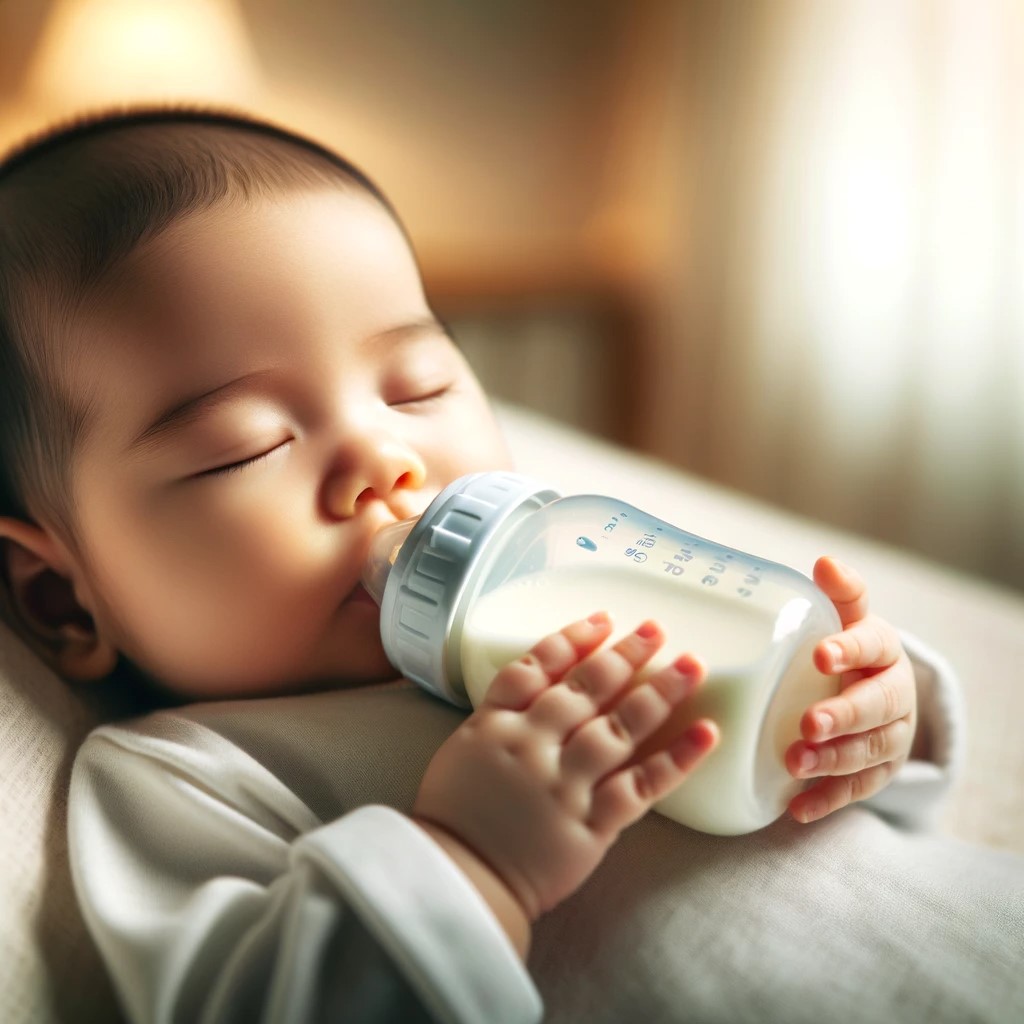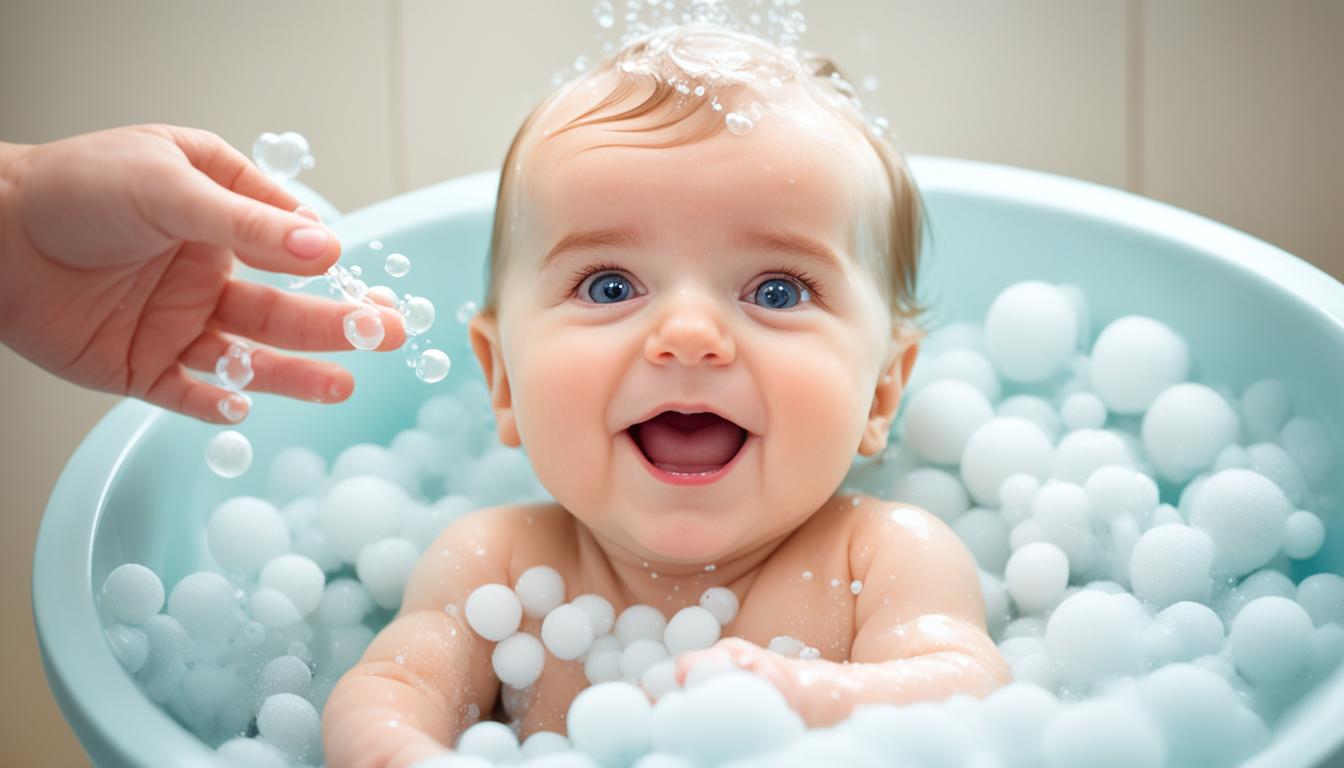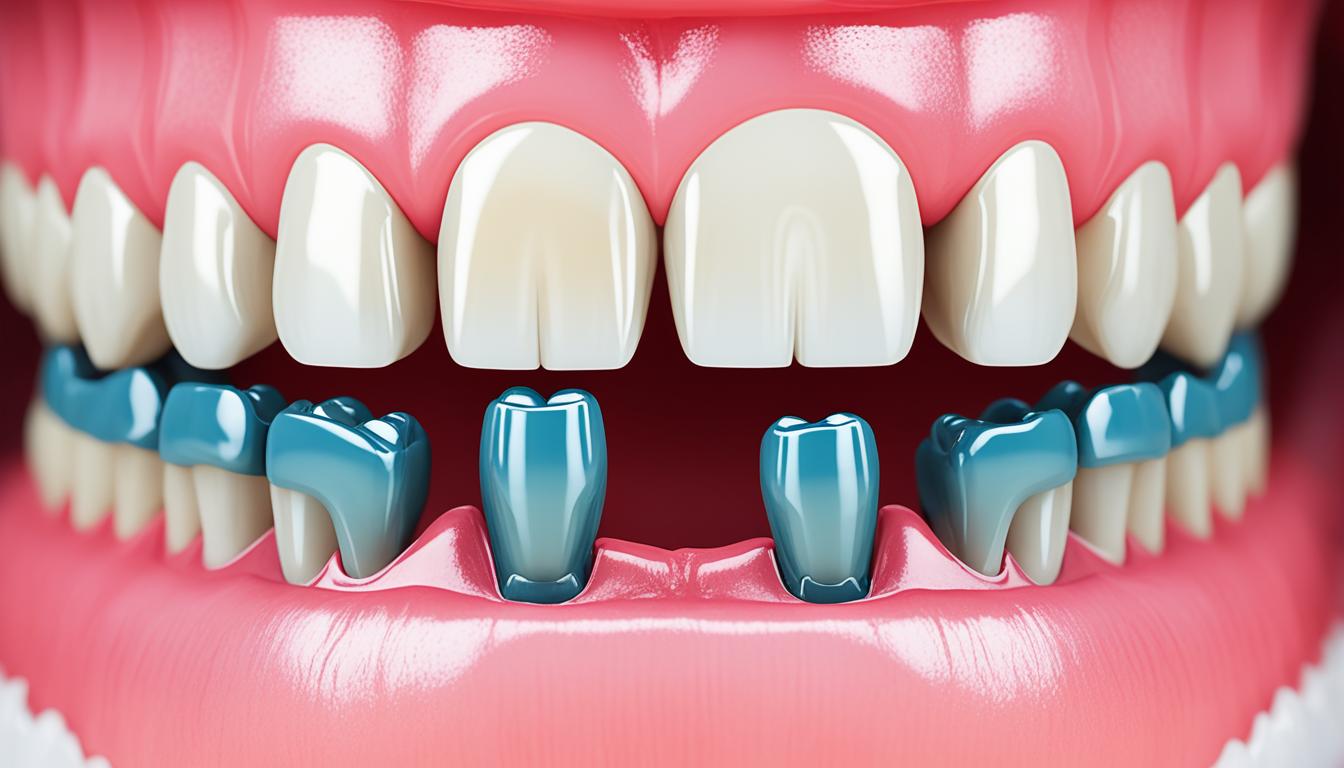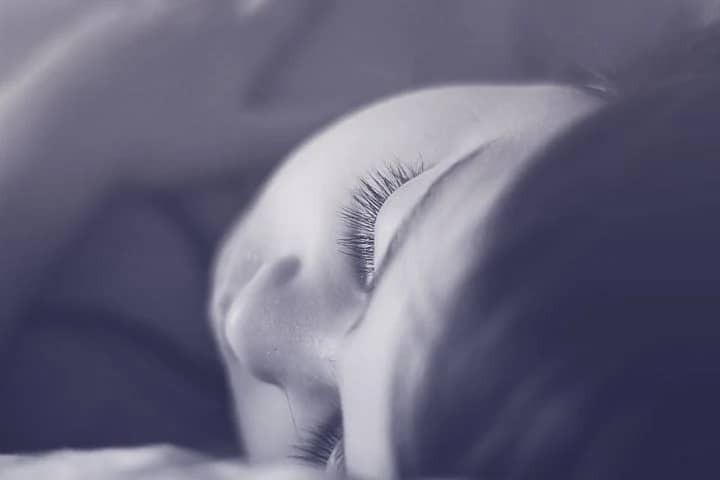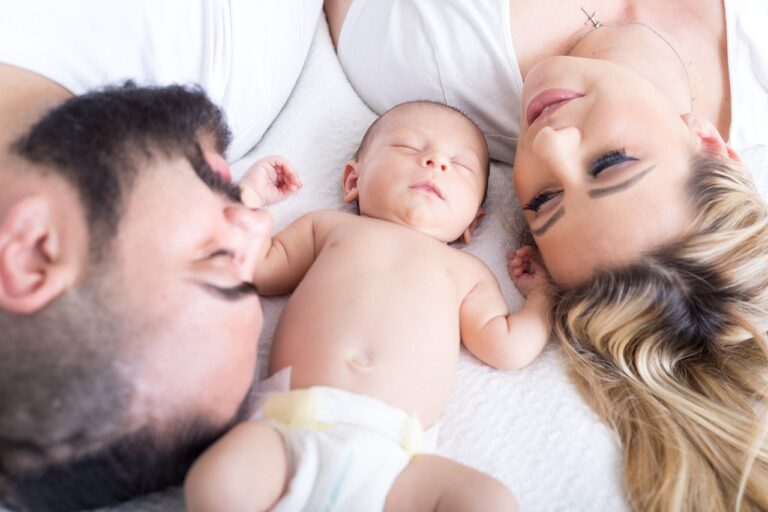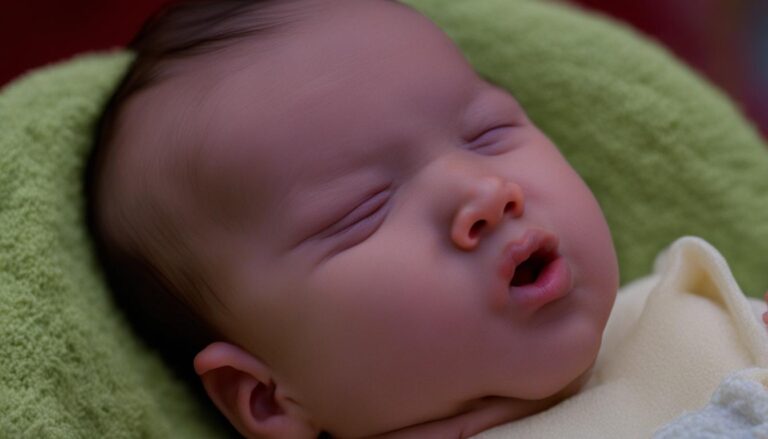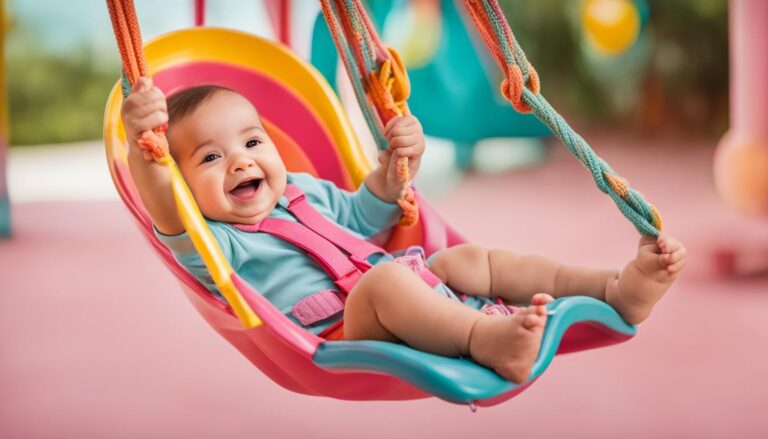Concerned? Baby Drinking But No Wet Diapers
Is your baby drinking but not producing wet diapers? It can be a cause for concern. Babies have small tummies and store less fluid compared to older kids and adults, making them more susceptible to dehydration. While babies usually get all the fluids they need from regular feedings, certain factors can lead to decreased urine output.
If your baby is exposed to extreme temperatures or loses fluids due to vomiting, diarrhea, or excessive sweating, they can quickly become dehydrated. Recognizing the signs of dehydration in babies is crucial to ensure their well-being.
- Fewer than six wet diapers in 24 hours
- Diapers staying dry for two or three hours
- Darker yellow and more concentrated urine
- Dry mucus membranes
- Tearless crying
- Dry and slack skin
- Sunken eyes
- Listlessness
- Sunken fontanelle (soft spot on the baby’s head)
Key Takeaways:
- Dehydration in babies can occur when they lose more fluid than they take in.
- Common causes of decreased urination in babies include extreme temperatures, vomiting, diarrhea, or excessive sweating.
- Signs of dehydration include fewer than six wet diapers in 24 hours, darker urine, dry mucus membranes, tearless crying, dry skin, sunken eyes, listlessness, and a sunken fontanelle.
- If your baby shows signs of dehydration, seek medical attention promptly.
- Treatment options for dehydration in babies may include increasing breast milk or formula intake, offering oral rehydration solutions, and in severe cases, rehydration with intravenous fluids under medical supervision.
Understanding Dehydration and Babies
Dehydration in babies can occur when they lose more fluid than they take in. This can happen due to inadequate fluid intake or excessive loss of fluids. It is important to recognize the signs of dehydration in babies to ensure their well-being.
Signs of Dehydration in Babies
If your baby is dehydrated, you may notice the following symptoms:
- No wet diapers for several hours
- Dark and concentrated urine
- Dry mouth and cracked lips
- Listlessness and irritability
- Sunken fontanelle (the soft spot on the baby’s head)
Dehydration can range from mild to severe, with severe dehydration being a life-threatening condition that requires immediate medical attention. It is important to monitor your baby’s fluid intake and look out for these signs to prevent dehydration from worsening.
“Dehydration in babies can have serious consequences if not addressed promptly. It is essential to be aware of the signs and symptoms and seek medical help if you suspect your baby is dehydrated.”
If you notice any signs of dehydration in your baby, it is important to consult a healthcare professional for proper evaluation and treatment. They can provide guidance on rehydrating your baby and preventing further dehydration.
Preventing Dehydration in Babies
To prevent dehydration in babies, it’s important to take certain precautions and ensure they stay hydrated. Here are some tips to protect your baby from dehydration:
- Protect your baby from extreme weather conditions by keeping them out of the sun. The sun’s heat can cause excessive sweating and fluid loss, leading to dehydration.
- Dress your baby in light, breathable clothing to prevent overheating.
- Avoid bundling them up in blankets while sleeping as it can make them too warm and increase the risk of dehydration.
As your baby relies on breast milk or formula for all their fluids and nutrients, it’s crucial to ensure they receive enough hydration:
- Until your baby starts eating solid foods, breast milk or formula provides ample hydration. Make sure to feed your baby frequently to meet their fluid needs.
- As you introduce solid foods and reduce the amount of breast milk or formula, offer small amounts of water and fluids from fruits and vegetables to maintain their overall hydration.
- During hot weather, it’s essential to increase your baby’s fluid intake. Offer additional milk and water to keep them hydrated and prevent dehydration.
“Proper hydration is vital for your baby’s health and well-being. By following these preventive measures and ensuring adequate fluid intake, you can protect your baby from dehydration and promote their overall health.”
Image:
Remember, if you have any concerns about your baby’s hydration or suspect dehydration, it’s important to seek medical advice. Your healthcare provider can offer guidance specific to your baby’s needs and provide appropriate treatment if necessary.
Treating Dehydration in Babies

If your baby is showing signs of dehydration, it’s important to seek medical attention for proper treatment. Depending on the severity of dehydration, treatments may include:
- Offering breast milk or formula more frequently to ensure adequate hydration.
- Giving small amounts of oral rehydration solutions like Pedialyte, which can help replenish lost fluids and electrolytes.
- Offering electrolyte replacement drinks recommended by your healthcare provider.
- Gradually increasing fluid intake if the baby can keep them down, aiming for a balanced rehydration process.
For older babies, water may be sufficient in mild cases of dehydration, but consulting with your healthcare provider is still advised. Severe dehydration may require rehydration with intravenous fluids, which should only be administered under a doctor’s care. It’s crucial to follow your doctor’s advice on how and when to administer these treatments to your dehydrated baby.
Remember, early intervention is key when it comes to treating dehydration in babies. If you suspect your baby may be dehydrated, don’t hesitate to seek medical attention to ensure their well-being.
Dehydration in Babies Due to Illness
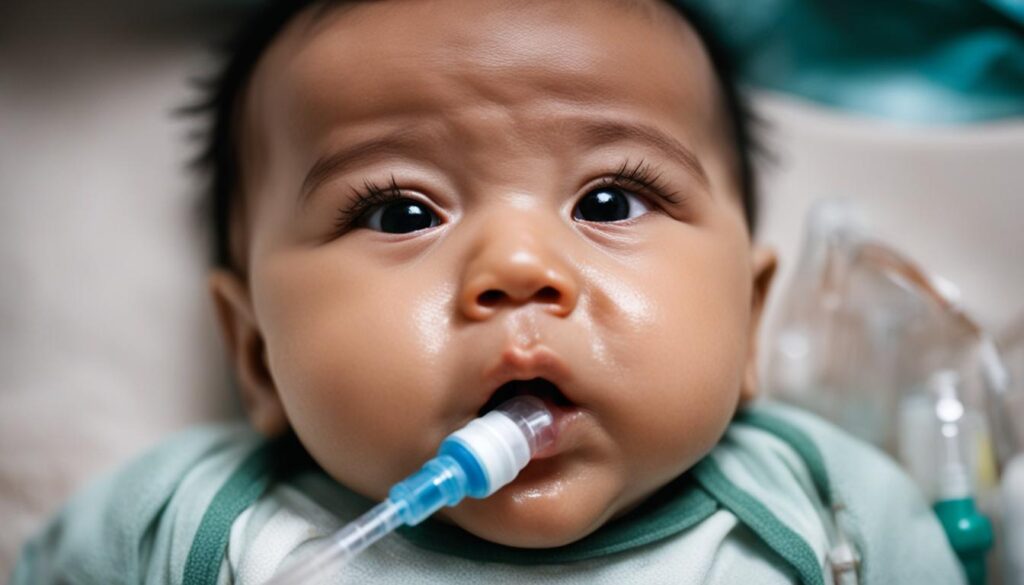
The most likely scenario for dehydration in babies due to illness is when they are sick and experience symptoms like vomiting and diarrhea. Good hand-washing practices and up-to-date vaccinations can help prevent dehydration during illness.
During illness, it’s essential to continue offering breast milk or formula to keep the baby hydrated. Oral rehydration solutions can also be used to replenish fluids and electrolytes lost through vomiting and diarrhea. If your baby is showing signs of dehydration, consult a pediatrician for proper treatment.
Dehydration in babies can be a serious concern, especially when they are sick. It’s important to monitor your baby’s fluid intake and ensure they are receiving enough fluids to stay hydrated during illness. By taking proper precautions and seeking medical attention when needed, you can help prevent and address dehydration in babies.
Recognizing Signs of Dehydration in Babies
Dehydration in babies can have serious consequences and should not be taken lightly. It’s important to be aware of the signs and symptoms of dehydration so that you can take immediate action to ensure your baby’s health and well-being.
One of the most noticeable signs of dehydration in babies is a decrease in wet diapers. If you notice that your baby is producing fewer wet diapers than usual, it may be an indication that they are not getting enough fluids. Darker and more concentrated urine is also a sign of dehydration.
Dry mouth and cracked lips are common symptoms of dehydration in babies. If you notice that your baby’s mouth is dry and their lips appear cracked or parched, it’s important to take action to increase their fluid intake.
Other signs of dehydration in babies include listlessness, irritability, and a sunken fontanelle (the soft spot on the top of the baby’s head). If your baby seems unusually tired or fussy, it may be a sign that they are dehydrated.
In severe cases of dehydration, babies may exhibit rapid breathing, a weak pulse, and extreme fussiness. These are signs of severe dehydration that require immediate medical attention.
“It’s crucial to pay attention to these signs and seek medical help if you suspect your baby is dehydrated. Timely intervention can prevent serious complications.”
Remember, babies rely on us to meet their hydration needs. If you suspect that your baby is dehydrated, consult with a healthcare professional for proper guidance and treatment.
Keeping your baby properly hydrated is essential for their overall health and well-being. By familiarizing yourself with the signs of dehydration, you can take prompt action to ensure that your baby stays healthy and hydrated.
Fluid Intake for Babies
When it comes to fluid intake for babies, it’s essential to ensure they are getting enough to stay hydrated and healthy. The amount of fluids they need may vary depending on their age, overall health, and environmental factors. Let’s take a closer look at how much fluid babies need and the different sources of hydration.
Breast Milk or Formula: Meeting the Early Fluid Needs
For the first 4 to 6 months of their lives, babies receive all the fluids they need from breast milk or formula. These liquids provide essential nutrients and keep them adequately hydrated. There’s usually no need to give them water during this period, unless explicitly advised by a healthcare professional.
Introduction of Solid Foods and Additional Fluids
As babies begin to eat solid foods, they naturally start getting small amounts of fluids from various sources. Fruits, vegetables, and sips of water contribute to their overall fluid intake. It’s crucial to ensure that the quantity of breast milk or formula decreases gradually, yet their total fluid intake remains sufficient. This adjustment ensures that babies receive the necessary fluids as they transition to a more diverse diet.
Fluid Intake Considerations: Hot Weather and Illness
During hot weather, it’s important to be extra vigilant about your baby’s fluid intake. The heat can increase the risk of dehydration, so it’s crucial to offer more milk and water to keep them hydrated. If your baby is experiencing an illness, continue offering breast milk or formula to prevent dehydration and consult a pediatrician for guidance on additional fluids, such as oral rehydration solutions.
Remember, every baby is unique, and their fluid needs may vary. It’s advisable to consult with your doctor for specific recommendations on fluid intake based on your baby’s age, health, and individual circumstances. By staying informed and monitoring your baby’s fluid intake, you can help ensure they stay hydrated and healthy.
Tips for Preventing Dehydration in Babies
To prevent dehydration in babies, it’s crucial to take certain precautions and ensure they stay adequately hydrated. Here are some tips to help you prevent dehydration in your little one:
1. Protect your baby from extreme weather conditions by keeping them out of the sun, especially during hot summer months. Dress them in light, breathable clothing to avoid overheating.
2. Avoid overdressing your baby while sleeping. Use light blankets or consider using a fan or air conditioning to maintain a comfortable sleeping environment.
3. Offer breast milk or formula frequently throughout the day. Remember, until your baby starts eating solid foods, breast milk or formula will provide all the necessary fluids and nutrients.
4. During illness, continue offering breast milk or formula to keep your baby hydrated. If necessary, consult a pediatrician for proper guidance on the best approach to ensure adequate hydration during illness.
5. Encourage your child to drink plenty of fluids when they are well, especially during physical activity or if they have been sweating. Water is the best choice, so try to avoid sugary drinks whenever possible.
6. Monitor your baby’s urine output. If you notice a significant decrease in wet diapers or suspect dehydration, seek immediate medical attention. A healthcare professional can help determine the best course of action and provide necessary treatment if needed.
Remember, preventing dehydration in babies is crucial for their overall health and well-being. By following these tips, you can help ensure your little one stays adequately hydrated and healthy.
FAQ
Should I be concerned if my baby is drinking but not producing wet diapers?
It’s important to monitor your baby’s urine output as fewer than six wet diapers in 24 hours or diapers staying dry for two or three hours could be a sign of dehydration. Seek medical attention if your baby hasn’t had a wet diaper for six or more hours, is unusually fussy or sleepy, or has cold and/or splotchy-looking hands and feet.
What are the signs of dehydration in babies?
Signs of dehydration in babies include no wet diapers for several hours, dark and concentrated urine, dry mouth and cracked lips, listlessness, irritability, and sunken fontanelle. Severe dehydration may show additional signs such as rapid breathing, weak pulse, and extreme fussiness.
How can I prevent dehydration in my baby?
To prevent dehydration, keep your baby protected from extreme weather conditions, dress them in light, breathable clothing, and avoid overdressing while sleeping. Offer breast milk or formula frequently. During hot weather, increase fluid intake by offering more milk and water.
How is dehydration in babies treated?
Treatment for dehydration in babies depends on the severity. It may involve offering breast milk or formula more frequently, giving small amounts of oral rehydration solutions, and gradually increasing fluids if the baby can keep them down. Severe cases may require rehydration with intravenous fluids under medical supervision.
How can I prevent dehydration in my baby during illness?
During illness, continue offering breast milk or formula to keep the baby hydrated. Oral rehydration solutions can also be used to replenish fluids and electrolytes lost through vomiting and diarrhea. Consult a pediatrician for proper treatment and guidance.
What are the signs of dehydration in babies?
Signs of dehydration in babies include fewer wet diapers than usual, darker and more concentrated urine, dry mouth and cracked lips, listlessness, irritability, sunken fontanelle, lethargy, lack of concentration, and paleness. Severe dehydration may show signs like weak pulse, rapid breathing, and extreme fussiness.
How much fluid do babies need?
Babies until about 4 to 6 months old get all the fluids they need from breast milk or formula. Once they start eating solid foods, small amounts of fluids also come from fruits, vegetables, and sips of water. Consult your doctor for specific recommendations on fluid intake for your baby.
What are some tips for preventing dehydration in babies?
To prevent dehydration in babies, protect them from extreme weather conditions, dress them in light, breathable clothing, and avoid overdressing while sleeping. Offer breast milk or formula frequently, especially during illness. Encourage your child to drink plenty of fluids when they are well and during physical activity. Avoid sugary drinks and opt for water whenever possible. Monitor your baby’s urine output and seek medical attention if you suspect dehydration.

